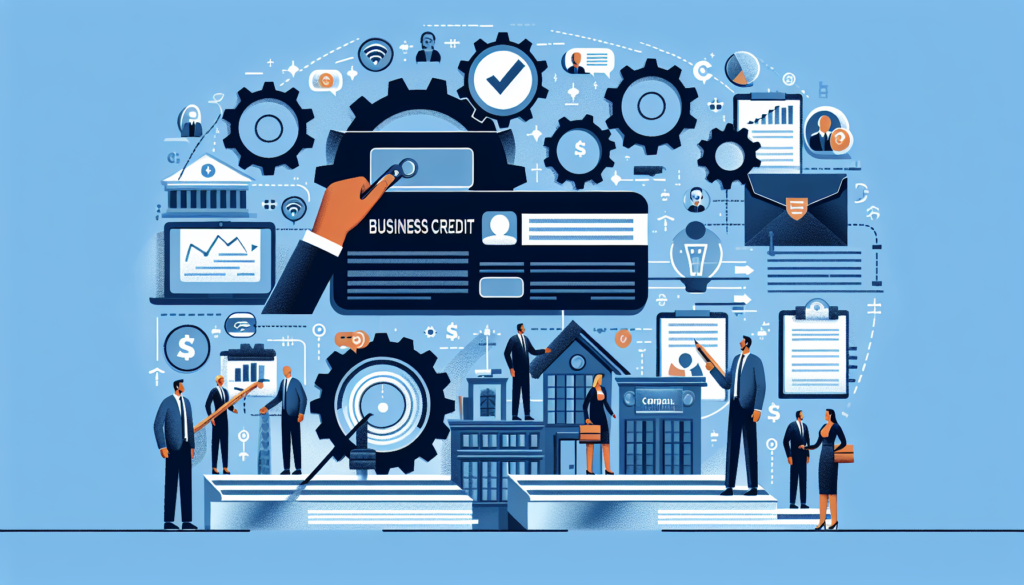Imagine you have a brilliant business idea and are ready to turn it into reality. But before you can start, you need to understand the concept of business credit. Business credit is a vital aspect of any successful venture, as it allows you to separate your personal and business finances and establish a strong financial foundation for your company. In this article, we will explore what business credit is, why it matters, and how you can build and maintain a good credit score for your business. So, whether you’re a seasoned entrepreneur or just starting out, let’s unlock the power of business credit together!

Definition of Business Credit
Business credit refers to the credit profile and financial reputation of a company or organization. It involves the creditworthiness and borrowing capacity of a business entity, separate from the personal finances of its owner(s). It is an important aspect of a company’s financial health and plays a crucial role in determining its ability to obtain loans, lines of credit, and other forms of financing.
Importance of Business Credit
Business credit is vital for the success and growth of a company. It allows businesses to access funding and financial resources needed to invest in new opportunities, expand operations, purchase inventory or equipment, and manage cash flow. good business credit can help establish trust and credibility with vendors, suppliers, and partners. It also provides a clear separation between personal and business liabilities, protecting the owner(s) from personal financial risk.
Distinguishing Business Credit from Personal Credit
It’s important to understand the distinction between business credit and personal credit. While personal credit is based on an individual’s personal financial history and habits, business credit focuses solely on the financial performance and creditworthiness of a business entity. This separation of credit profiles is important because it allows businesses to establish their own creditworthiness and protects personal assets from business liabilities. Having a separate business credit profile also provides a clearer financial picture to creditors and lenders when assessing the borrowing capacity and credibility of a company.
Establishing a Business Entity
To begin building business credit, the first step is to establish a formal legal entity for your business. This can be done by registering your business as a corporation, limited liability company (LLC), or partnership, depending on the structure that best suits your needs. By having a legally recognized business entity, you can establish a separate financial identity for your business and start building its credit profile.
Separating Personal and Business Finances
It is essential to maintain a clear distinction between personal and business finances. This involves opening separate bank accounts for your business and ensuring that all business transactions are conducted through these accounts. Mixing personal and business finances can result in challenges when trying to establish business credit and can also create potential legal and tax issues. By keeping personal and business finances separate, you can accurately track business expenses, income, and establish a solid financial foundation for your business.
Opening Business Bank Accounts
When building business credit, it is important to open dedicated bank accounts for your business. This includes a separate checking account and, if needed, a business savings account. Having these accounts in the name of the business helps establish the credibility and legitimacy of your company. Additionally, it allows for better organization of business transactions and provides a clear audit trail for accounting purposes. Keeping meticulous records of your business finances will contribute to the establishment of a solid credit history for your business.
Obtaining an Employer Identification Number
An Employer Identification Number (EIN) is a unique nine-digit identification number issued by the IRS for tax purposes. It is necessary to obtain an EIN for your business, as it is often requested by lenders, creditors, and business credit reporting agencies. An EIN helps in establishing a clear separation between personal and business finances, and it also provides a legal identity to your business. Applying for an EIN is a straightforward process and can be done online through the IRS website.
Registering with Business Credit Bureaus
In order to establish and build business credit, it is important to register your business with one or more business credit bureaus. These bureaus collect and maintain information about the creditworthiness and financial performance of businesses. Registering with these bureaus allows your business credit history and payment records to be tracked and reported to potential creditors and lenders. Some of the major business credit bureaus include Dun & Bradstreet, Experian Business, and Equifax Small Business.
Payment History
One of the most significant factors affecting business credit is the payment history of a company. Prompt and consistent payment of bills, supplier invoices, and loan installments demonstrates financial responsibility and contributes to a positive credit profile. Late payments or defaults can have a negative impact on a business’s creditworthiness and can result in difficulties in obtaining future financing. Therefore, it is crucial to make timely payments and honor all financial obligations to maintain a good business credit score.

Credit Utilization
Credit utilization refers to the percentage of available credit that is being used by a business. As with personal credit, it is important to keep credit utilization low in order to maintain a good business credit score. Using a high percentage of available credit can indicate financial strain or an increased risk of defaulting on debt, which can negatively impact a business’s creditworthiness. Keeping credit utilization below 30% is generally considered favorable for building and maintaining good business credit.
Length of Credit History
The length of a business’s credit history is an important factor in determining its creditworthiness. A longer credit history demonstrates the business’s ability to manage credit responsibly over time. It provides creditors and lenders with a track record of financial performance and payment consistency. As a business owner, establishing credit relationships early and maintaining them consistently over time can have a positive impact on your business’s creditworthiness.
Public Records and Bankruptcies
Public records such as bankruptcies, liens, and judgments can have a severe negative impact on a business’s creditworthiness. These records indicate financial struggles or legal issues and can make it difficult for a business to obtain credit. It is essential to avoid bankruptcy and legal disputes that may negatively impact your business credit. Ensuring financial stability and responsible management of debt can help protect your business credit profile from negative public records.
Credit Inquiries
Credit inquiries refer to the number of times a business’s credit profile is accessed by creditors or lenders. While occasional credit inquiries are normal and necessary when seeking financing, excessive inquiries within a short period of time can raise concerns among potential lenders. Multiple credit inquiries can indicate a greater risk or financial instability. It is important to minimize unnecessary credit inquiries and be mindful of the impact they can have on your business credit score.
Trade Credit
Trade credit is a type of business credit where suppliers and vendors extend credit terms to a customer to delay payment for goods and services. This allows businesses to generate revenue from sales before having to pay for the cost of goods or services. Trade credit arrangements often involve agreed-upon terms such as net 30, net 60, or net 90 days, with payment due at a later date. Successfully managing trade credit can help businesses improve cash flow and build positive relationships with suppliers.
Business Credit Cards
Business credit cards are specifically designed for business expenses and can contribute to building a business’s credit profile. Using a business credit card responsibly, making timely payments, and keeping credit utilization low can demonstrate financial responsibility and positively impact a business’s creditworthiness. Business credit cards often offer additional benefits such as rewards programs, expense tracking tools, and access to business-specific perks.
Lines of Credit
A line of credit is a flexible form of financing that gives a business access to funds up to a specified credit limit. Similar to a credit card, a line of credit allows businesses to borrow funds as needed, repay them, and borrow again within the predetermined limit. By responsibly utilizing a line of credit, businesses can improve their creditworthiness by demonstrating the ability to manage credit effectively and responsibly.
Term Loans
Term loans are a common form of business credit where a lender provides a fixed amount of money to a business, which is then paid back over a predetermined period of time with interest. Term loans can be used for various purposes such as purchasing equipment, expanding operations, or funding long-term projects. Repaying a term loan in a timely manner can positively impact a business’s credit profile and establish a history of responsible credit management.
Small Business Administration Loans
Small Business Administration (SBA) loans are government-guaranteed loans designed to assist small businesses in obtaining financing. These loans offer more favorable terms and conditions compared to traditional loans and can be an excellent option for businesses looking to build credit and access funding. Successfully obtaining and responsibly repaying an SBA loan can significantly contribute to building a positive business credit history.

Access to Funding
One of the primary benefits of a good business credit profile is access to funding. Establishing and maintaining a strong business credit score increases the likelihood of obtaining loans, lines of credit, or financing from banks, financial institutions, and alternative lenders. Adequate funding is essential for businesses to invest in growth opportunities, manage cash flow, and seize business expansion initiatives.
Improved Cash Flow
Good business credit can contribute to improved cash flow by allowing businesses to negotiate more favorable payment terms with suppliers and vendors. Having a solid credit profile and reputable payment history can lead to the extension of credit terms, such as net 30 or net 60 days, giving businesses a longer time to make payments. This can help maintain sufficient working capital and ensure smooth operations without straining cash flow.
Ability to Build Trust and Credibility
Establishing business credit is crucial for building trust and credibility with vendors, suppliers, partners, and even customers. A strong business credit profile demonstrates financial responsibility, consistent payment history, and a track record of managing credit effectively. This can inspire confidence in business partners and provide a competitive edge in securing desirable partnerships, favorable terms, and business opportunities.
Opportunities to Establish Strong Vendor Relationships
A good business credit score can also open doors to establishing strong vendor relationships. By consistently demonstrating the ability to make payments on time and manage credit responsibly, businesses can build trust with suppliers, leading to favorable terms, discounts, and potential exclusivity arrangements. Strong vendor relationships can contribute to cost savings, increased efficiency, and mutually beneficial partnerships.
Separating Personal and Business Liabilities
Maintaining separate personal and business credit profiles helps protect personal assets from potential business liabilities. By establishing business credit, businesses can avoid personal guarantees on loans and other forms of financing. This separation allows owners to limit personal financial risk and safeguard their personal finances in the event of business challenges or setbacks. Clear separation between personal and business liabilities can provide peace of mind and protect personal financial standing.
Monitoring Credit Reports
To ensure the health and accuracy of your business credit information, it is important to regularly monitor your business credit reports. Business credit bureaus provide reports that detail your credit history, payment records, and other relevant financial information. Regular monitoring allows you to identify and address any errors or discrepancies that may negatively impact your creditworthiness. It also provides insights into how your business credit profile is being perceived by potential creditors and lenders.
Making Timely Payments
One of the simplest and most effective ways to maintain good business credit is by making timely payments. Late payments can damage your business credit score and indicate financial instability or irresponsibility. Setting reminders, using automated payment systems, and establishing good cash flow management practices can help ensure that you never miss a payment and maintain a positive payment history.
Maintaining a Good Credit Utilization Ratio
Responsible credit utilization is a key factor in building and maintaining good business credit. Ideally, businesses should aim to keep their credit utilization below 30% of their available credit. This demonstrates an ability to manage credit responsibly and avoids the appearance of excessive debt. By keeping credit utilization low, businesses can improve their creditworthiness and increase their chances of obtaining favorable financing terms.
Avoiding Excessive Debt
While it can be tempting for a business to take on more debt during growth or expansion phases, managing debt responsibly is crucial. Taking on excessive debt can negatively impact your business credit profile and strain cash flow. It is important to carefully evaluate your business’s financial capabilities and only take on debt that can be comfortably repaid within a reasonable period of time.

Updating Business Information
Keeping your business information up-to-date is an essential part of building and maintaining a good business credit score. This includes ensuring accurate and current contact information, business address, phone numbers, and ownership information with business credit bureaus and other relevant entities. Regularly reviewing and updating business information helps maintain the accuracy of your credit profile and ensures that potential creditors and lenders have the most recent and correct information.
Creating a Positive Credit History
To establish a good business credit score, it is important to create a positive credit history. This involves consistently paying bills and loan installments on time, maintaining low credit utilization, and responsibly managing credit. A positive credit history demonstrates financial responsibility and can help build trust with potential creditors and lenders.
Demonstrating Responsible Credit Management
Responsible credit management is a key component of establishing a good business credit score. This includes using credit wisely, making timely payments, and avoiding excessive debt. Demonstrating responsible credit management shows potential creditors and lenders that you are a reliable borrower and capable of managing credit responsibly.
Keeping Business Information Consistent and Up-to-Date
Consistency and accuracy are crucial when it comes to building and maintaining good business credit. It is important to ensure that your business information is consistently represented across different platforms and credit bureaus. Any discrepancies or inaccuracies should be addressed promptly to avoid confusion or potential negative impacts on your credit profile.
Maintaining a Low Credit Utilization Rate
Similar to personal credit, maintaining a low credit utilization rate is important for a good business credit score. Keeping credit utilization below 30% demonstrates financial discipline and the ability to manage credit effectively. By managing credit utilization carefully, businesses can improve their creditworthiness and increase their chances of obtaining favorable financing terms.
Avoiding Credit Inquiries
Excessive credit inquiries can negatively impact your business credit score. It is important to be mindful of the number of credit inquiries made within a short period of time. While occasional inquiries are necessary when seeking financing, too many inquiries can signal financial instability or desperation for credit. Minimizing unnecessary credit inquiries can help protect and maintain a good business credit score.
Guarding Against Identity Theft
Protecting your business credit from identity theft is essential. Monitoring your credit reports regularly can help identify any suspicious activity or unauthorized access to your business credit profile. It is important to take steps to safeguard sensitive information and implement security measures to mitigate the risk of identity theft. Promptly reporting any fraudulent activity is crucial to protecting your business credit.
Avoiding Fraudulent Activities
Engaging in fraudulent activities can have severe consequences for your business credit. Fraudulent actions such as using false information to obtain credit or engaging in scams can significantly damage your business’s creditworthiness and reputation. It is important to maintain ethical business practices and adhere to legal and regulatory requirements to protect your business credit.
Monitoring Credit Reports Regularly
Regularly monitoring your business credit reports is important for identifying any errors, discrepancies, or fraudulent activity that may negatively impact your creditworthiness. By staying vigilant and reviewing your credit reports regularly, you can address and rectify any issues promptly, ensuring that your credit profile accurately reflects your business’s financial standing.
Responding to Credit Disputes
In the event that you encounter any inaccuracies or discrepancies on your business credit reports, it is important to initiate a credit dispute to rectify the situation. This involves contacting the credit reporting agencies and providing supporting documentation to support your claim. Timely resolution of credit disputes helps maintain the accuracy and integrity of your business credit profile.
Seeking Professional Credit Help
If you encounter challenges or difficulties in managing and improving your business credit, seeking professional credit help can be a valuable resource. Credit professionals have the knowledge and expertise to navigate the complexities of business credit and can provide guidance on improving your credit profile. They can help you develop a strategy to address credit issues, build positive credit history, and ultimately improve your business credit score.
Assessing the Current Situation
When it comes to rebuilding and repairing business credit, the first step is to assess the current situation. This involves reviewing your business credit reports, identifying any negative marks or discrepancies, and understanding the factors contributing to a low credit score. By assessing the current state of your business credit, you can develop a targeted plan of action to address and rectify the issues.
Developing a Plan of Action
Once you have assessed the current state of your business credit, it is important to develop a comprehensive plan of action. This plan should outline the steps and strategies you will undertake to rebuild and repair your business credit. It should include specific goals, timelines, and actionable tasks to help guide your efforts and monitor progress.
Addressing Past Credit Issues
To rebuild and repair business credit, it is essential to address any past credit issues that may be negatively impacting your creditworthiness. This may involve resolving outstanding debts, negotiating payment plans with creditors, or settling any legal disputes that may be affecting your credit score. By addressing past credit issues, you can demonstrate a commitment to rectifying financial challenges and rebuilding your credit profile.
Establishing New Positive Credit History
Building a positive credit history is a critical component of rebuilding and repairing business credit. This can be achieved by responsibly managing new credit accounts, making timely payments, and keeping credit utilization low. Over time, establishing new positive credit history can help offset past credit issues and contribute to an improved credit score.
Seeking Professional Credit Repair Assistance
If rebuilding and repairing business credit proves to be challenging or overwhelming, seeking professional credit repair assistance is an option worth considering. Credit repair professionals can provide expert guidance and support in navigating the credit repair process. They can help negotiate with creditors, identify strategies to rebuild credit, and offer personalized solutions tailored to your business’s specific credit challenges.
In conclusion, understanding business credit is essential for any business owner. Building and maintaining a good business credit profile can open doors to funding opportunities, improve cash flow, establish trust and credibility, and protect personal assets. By establishing a separate legal entity, maintaining separate personal and business finances, and managing credit responsibly, businesses can build strong credit profiles and enjoy the benefits that come with them. Regularly monitoring credit reports, making timely payments, and addressing credit issues promptly are vital for maintaining good business credit. With careful attention and strategic actions, businesses can establish and maintain a solid business credit score that will benefit them for years to come.

